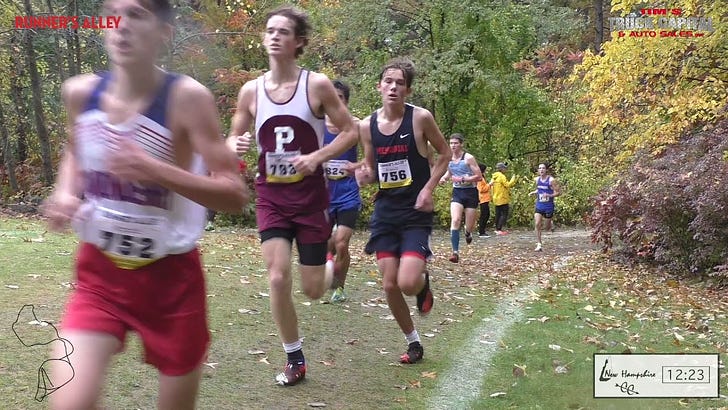From talk about crossing the country to talking cross-country
Also, putting the grilling of recent bad actors on pause
At 6:30 a.m. today, for the second time this week, I’m scheduled to board a flight out of Denver. If that flight isn’t canceled, and the other two flights I’m supposed to be on later in the day happen as planned, I’ll find myself in Concord, New Hampshire tonight.
That’s the easy part. If I make it from Concord downstate to Mine Falls Park in Nashua on Saturday afternoon, I’ll be offering commentary for New Hampshire Cross Country dot com during the boys’ and girls’ races at the New Hampshire Cross-Country Meet of Champions. The videos of these races will magically appear on the site’s YouTube channel sometime on Sunday, probably after an unprecedented amount of sound editing.
I didn’t know I would be part of these productions until last night, and it didn’t occur to me that I have never done something exactly like this before until just now. I’m not worried, because I was assured at a young age that I could do anything I put my mind to when I grow up, and it’s getting pretty close to that time. Also, besides possessing a formidable array of running arcana and an unabashed willingness to invent believable facts on command, I have charisma and poise practically falling out of my nose at this point.
Better still, cross-country has been on my mind all fall, and really for years on end, with only one sabbatical (so I could watch Breaking Bad). But with the New Hampshire and Colorado State Championships both held last Saturday, plus a few other races I had more than a spectator’s stake in, I’m especially drawn in despite my bumpy life schedule.
More than anything else, perhaps because this is my first trip eastward in two years, I find myself considering how changes to the youth levels of the sport have taken different forms in different parts of the country.
Colorado prep teams have been reaching surreal heights of excellence this fall, and I had planned on writing about that, but now I think I’ll just talk about it on Saturday with fellow race-describer Jim MacKenzie instead. I’ve known Jim since New Hampshire was mostly an Australian penal colony; soon, you’ll feel like you have, too.
Colorado, like most states, doesn’t have a “meet of champions” that combines the best individuals and teams from its divisional state meets. It’s too large and too rectangular, though not precisely so. The New Hampshire Meet of Champions, on the other hand, exists, and draws eighteen boys’ and girls’ teams from the three divisional state championship meets, along with any individuals on non-advancing teams who finish in the top 30 (D-1), 25 (D-2), or 20 (D-3) at those meets.
You can watch any of the six New Hampshire state meet races from last Saturday at Derryfield Park in Manchester on this dedicated playlist. Aggregated results are here.
Regarding other current events, my view of what’s become known and surmisable following recent revelations about the University of Oregon’s distance programs can be reduced to three concerns.
The first is the intentionally inflammatory and incorrect use of the term “body-shaming” in most (not all) of the stories about the situation. This is not a trivial concern, mainly because accusing someone of “body-shaming” implies (usually) absent malicious intent. Sometimes, hurt feelings, and physical pain, can result from the mostly well-intentioned mistakes of other people. The 2021 rush to assume the absolute worst motives when any kind of perceived injustice or power imbalance exists is as strong in running as it is anywhere else.
My second concern, broadly speaking, is that the data Oregon is collecting can be, and probably is being, used to generate more “bad” outcomes than “good” outcomes, and not by accident. Also—and this isn’t a remark about the interviewed Oregon runners who left the program unhappy, it’s a general observation—student-athletes often bear at least some of the responsibility for why a given school doesn’t work out for them. 18- and 19-year-old kids aren’t all angels, and they don’t always tell the truth.
My third and perhaps most predictable viewpoint is that the people lodging the most aggressive complaints about the Oregon coaching system have, conspicuously, little to no credibility. Briefly, Oregon’s winning-oriented system (which produces a lot of championships) is proving too ruthless and ethically precarious for certain critics, when those very critics (who produce a lot of rage and followers) have shamelessly demonstrated, and continue to demonstrate, amazing levels of hypocrisy in their own Nike-esque quests to “win”—be it monetizable online approval or a battle in a blind gender war.
What every sensible distance-running fan wants is for young people trying to achieve their best—which may be worth a college scholarship or may be worth “only” a 7:30 mile—to avoid as much needless discomfort as possible in that quest, be the source abusive (or merely inept) coaching, unfair discrimination, or the consequences of someone else’s cheating. But it is just as important for people claiming to be allies of this goal—especially current or former professional runners—to be sincere about this allyship, rather than usurp it for purely personal gain, and avoid committing the same errors and sins they’re seeing in the people they want punished.
In the interest of avoiding some of those sins, or at least not inducing needless discomfort, I’m tabling a full post on that—most of which is already written—until (probably) early next week. Besides, I need a nap.

